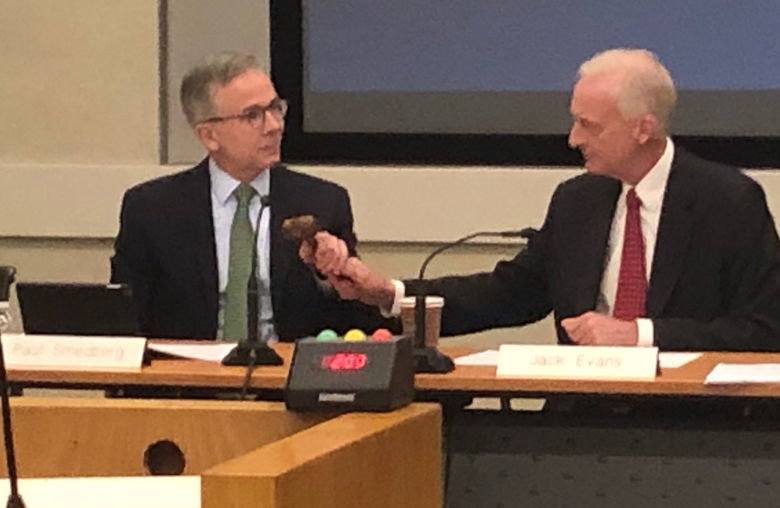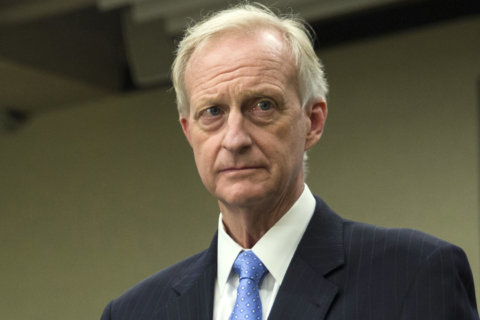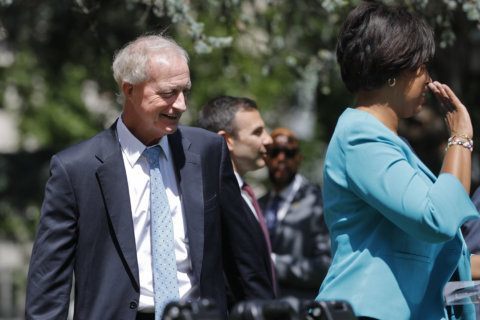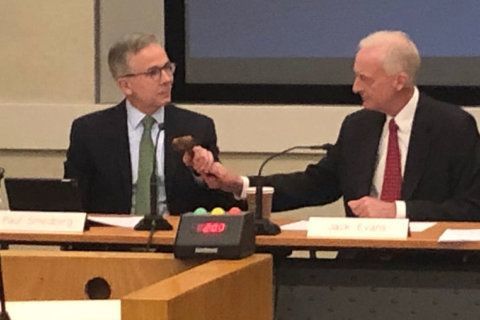
Virginia’s Paul Smedberg is the new chairman of the Metro Board, replacing D.C. Councilmember Jack Evans, who resigned from the board Thursday less than a week after federal agents raided his home.
Despite a finding from Metro’s Ethics Committee that Evans violated conflict of interest rules, Smedberg honored Evans with a glass plaque, similar to those regularly given to all outgoing board members, shortly after Evans passed him the gavel.
“Notwithstanding the recent events, I feel it’s appropriate to recognize the former chair for his four years of work on behalf of WMATA,” Smedberg said during Thursday’s board meeting
“Jack did do a lot to push the idea of dedicated funding forward, and he advocated strongly for the riders, and so we wanted to recognize that,” Smedberg added later.
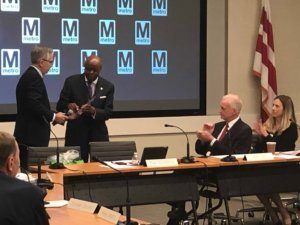
Federal investigators raided Evans’ home last week, looking for evidence tied to allegations Evans used his public positions as D.C. councilmember and Metro Board chair for personal gain.
The glass plaque given to Evans Thursday has a Metro logo and reads “The Metro Board of Directors recognizes and thanks Jack Evans for his dedicated service as WMATA Board Chair January 2016-June 2019.”
Evans was reprimanded by the D.C. Council in March; now, the council is opening its own investigation due to leaked results of Metro’s internal probe and plans to remove Evans as Finance Committee chairman next month.
Evans defended his record not by addressing the ethics issues head-on, but instead with a “top 10” list of what he described as Metro’s biggest accomplishments during this stint on the board. The list prompted scoffs from some people with Metro’s largest union, Amalgamated Transit Union Local 689, who were sitting in the back of the room.
Evans’ list ranges from hiring General Manager Paul Wiedefeld to financial changes, dedicated funding and what Evans described as safer and more reliable service.
“I believe firmly that I am leaving Metro in a better situation than I found it, and, many times in life, I guess that’s the best you can hope for,” Evans said. “Metro is really, really on the upswing.”
Smedberg, a former member of the Alexandria Council, identified three major areas where he believes changes are needed over the next year: Metro Board ethics rule reforms, the renewal of special annual federal capital funding for Metro, and continued efforts to focus more on riders, boost ridership and win back confidence with an even better, safer and more reliable system.
Metro’s Ethics Committee found Evans helped a parking company he secretly had a $50,000 contract with, including by providing internal Metro documents to the company and attempting to get Metro’s inspector general to investigate competitors. The committee did not take action on additional ethics issues identified by an outside law firm hired to look into Evans after the committee split 2-2.
Earlier Thursday, three of the four members of the committee suggested a number of reforms that could be taken up in the future to reduce the secrecy surrounding ethics investigations and lead to clearer outcomes.
“I think it’s important for the public to understand that the Ethics Committee acted in good faith and earnestly, and in a spirit of fairness given the circumstances facing it,” federal appointee David Horner said.
The suggested changes, which could be formally considered in coming months, would expand the committee to five members, up from four, to avoid tied votes; require a limited public report of any investigations; require the full board vote to close any investigation; require an inspector general’s review of investigations, and require all Metro Board financial disclosures to be posted publicly.
“The characterization of our proceedings as an act of cynicism and secrecy is wrong and unfair to the members of the committee,” Horner said, given the 2016 rules they were operating under.
Maryland’s Michael Goldman acknowledged some of the caution was due to concerns that a report could be used against Metro in future lawsuits, and other concerns tied to the Metro investigation of the swap of a Metro land sale for a lottery contract then-D.C. Councilmember and Metro Board member Jim Graham worked on.
Corbett Price, the D.C. representative on the committee that investigated Evans, did not sign onto the recommendations. He had backed Evans’ initial false claims that the Ethics Committee had not found a violation by Evans, and the Metro Board did not appoint him to the open vice chair slot for the coming year.
The Metro Board is holding off on setting other committees until D.C. picks a permanent replacement for Evans. The new D.C. representative will be the board’s first vice chair; Goldman will be the second vice chair.
Until a permanent replacement for Evans is selected, D.C. alternate Tom Bulger will serve in his place and hold the first vice chair position.

